It's already a fist victory for the French Left, who announced the creation of a large alliance for the 30th of June snap election. This alliance is called the "New Popular Front" and the title is not chosen randomly. It recalls the coalition between leftist and radical (center) forces in 1936, to counter the rise of the "leagues" and former First World War veterans associations, considered as "fascist" movements.
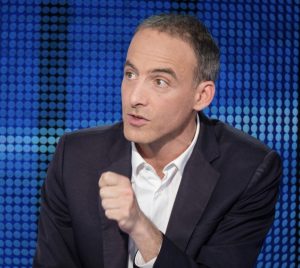
This alliance is formed by the Socialist Party, the Rebellious France, the Communists, the Ecologists and smaller leftist forces such as Public Place (Raphael Glucksmann), GenerationS (Benoit Hamon), The New Anticapitalist Party (Philippe Poutou) as well as other even smaller groups, civil associations and syndicates. When you look to the right of the French political landscape and you see the scandals and exclusions from the last days (Eric Ciotti, Marion Maréchal), this Left coalition shows a lot of political maturity. Historically, in four crucial moments of the French history the Left managed to get over its divisions and unite to accede or conserve power: in 1877, under Léon Gambetta, it got rid of the monarchy restoration claims and durably anchored the Republic; in 1936, the first Popular Front led to the Léon Blum and Camille Chauteamps governments; in 1981 it formed the Mauroy II Socialist-Communist government and in 1997 the Plural Left coalition governed France until 2002. The united Left also had a failed attempt under the Common Program led by Socialists and Communists, but their coalition didn't manage to elect François Mitterrand as President of the Republic in 1974 and eventually was dismantled in 1977. However, in all these previous five occasions, the left had powerful figures such as Léon Gambetta, Jules Ferry, Léon Blum, Maurice Thorez, François Mitterrand, Georges Marchais, Claude Estier, Lionel Jospin and Dominique Strauss-Kahn. This is not the case now. While Jean-Luc Mélenchon is acting low profile because of his divisive and radical character, only Olivier Faure, the Socialists' First Secretary, and Raphael Glucksmann, the Public Place leader, are better known to the public opinion. The absence of strong leaders is a clear disadvantage for such a large coalition.
It is commendable that divergent opinions regarding Ukraine and the Israeli-Palestinian conflict did not hamper the forming of this alliance. The Socialists and Public Place imposed their positions on these two issues to the Rebellious, as the program of the New Popular Front underscores the support for arms delivery to Ukraine and condemns the " terrorist massacres".
The alliance puts a lot of pressure on the Presidential majority, who is now relegated in a fragile third position in a first-pass-the-post election. If President Macron was hoping that the short timespan left until the snap election would not allow the left to unite its forces and to support support his candidates, he got it wrong. As it stands today, it looks like most of the second round finals on July 7 will be between the National Rally and the New Popular Front.
After he publicly praised the New Popular Front alliance on the evening of June 13, the official announcement came two days later. François Hollande is running for an MP seat in his Tulle stronghold. It is quite strange for a former President of the Republic to run for an MP seat, only Valéry Giscard d'Estaing doing that in the entire history of the Vth French Republic. Hollande justified this move by a need to get over divergences and "get to the core of things", which is now the imperious need to block the far-right's rise to power.
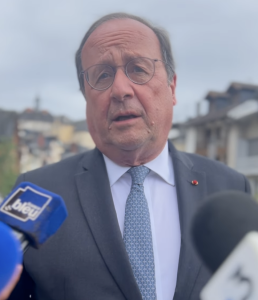
It is clear that François Hollande was searching for an appropriate moment to get back into politics. The timing looks great, since the left will probably get a good score and, as a former President, François Hollande will be one of the leaders of the new alliance. This news took by surprise the Headquarters of the Socialist Party, who prepared another candidate for that specific constituency. The Headquarters "took note of the local organisation's decision to invest former President Hollande". French media report that Hollande somehow inlayed himself to an evening party where wasn't invited. His run is contested by many voices, including by his former Prime Minister, Manuel Valls, who accused him to take seat at the same table with the Rebellious. Far-left movements of the New Popular Front also criticized Hollande for putting a halt to social reforms during his presidential mandate and for paving the way for Emmanuel Macron's accession to power.
François Hollande's bid sends a strong message of inclusion and willingness to gather all voices of the Left, but only time will tell if he will be an asset or a millstone for the New Popular Front. At least for the snap election, the future of this alliance looks rather rosy.
We just witnessed the craziest 72 hours in a decade for the French Right. Only the elimination of Nicolas Sarkozy and Alain Juppé by François Fillon in the party contest for the 2017 presidential election could compete with what happened since Monday, June 10th.
After president Macron dissolved the National Assembly, both the Republicans and the Reconquest leaderships showcased their division upon the strategy to follow for the snap election. Unfortunately, only two options lie ahead of them: either they stand in the future parliamentary election on their own, either they enter a wider Right Union platform, led by Marine Le Pen's National Rally. Being part of the platform will bring them a consistent presence in the future Assembly, while standing alone will make them irrelevant, because the scrutiny is a two-round first-past-the post and this type of scrutiny goes strongly against small parties' candidates. However, entering the French Assembly as satellites of Marine Le Pen is not ideal for any of these two parties.
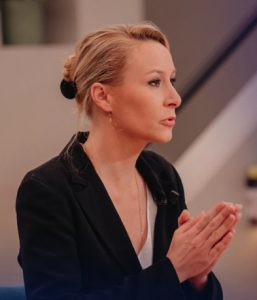
Against this background, Marion Maréchal moved first and tried to strike an agreement between her party (Reconquest) and the National Rally. It is unclear who mandated her to do that but, after a relative openness from Jordan Bardella and her aunt, Marine Le Pen, the National Rally informed her that it doesn't want any "direct or indirect" association with the Reconquest leader, Eric Zemmour. Nevertheless, Zemmour strongly defended his position to present Reconquest candidates in all French constituencies. Marion Maréchal and her team publicly criticised her party leader's position, considering it a huge mistake that will pave the way for either a Macron or a Leftist victory in the snap election. On Tuesday, Zemmour decided to exclude Marion Maréchal of Reconquest on "betrayal" grounds. Marion announced that she will support the Right Union candidates, but she will not join the National Rally.
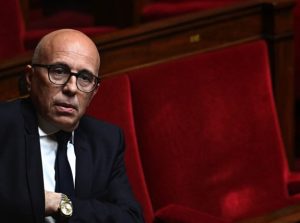
At the Republicans, it was the president himself, Eric Ciotti, the one who decided to enter into an agreement with the National Rally. This means that the National Rally will not propose any candidate in some 80 constituencies, leaving the Republicans as sole candidates on behalf of the right. The Republican Party Committee unanimously excluded president Ciotti, who sued the putschists in Tribunal. Ciotti allegedly tried to prevent the meeting that led to his exclusion by closing the party offices and sending employees at home for Wednesday afternoon. However, a "traitor" offered a key duplicate to the Republicans Secretary General, Annie Gennevard. Gennevard, together with the no. 1 on the Republican list for the European election, François-Xavier Bellamy, and the Treasurer of the party, Daniel Fasquelle, took over as an interim leadership. However, all this takes a rather comic turn on Thursday, 13th of June, when Ciotti returns to his presidential party office to work "for France". Questioned about who would he support in a second round, in those constituencies where Republican candidates will be eliminated in the first round, Bellamy said he would "obviously" support the National Rally. Therefore, Republican putschists clearly consider any pre-electoral agreement with the National Rally as unacceptable, but they could support Marine Le Pen's candidates in a second round. This looks rather as an ideological position, originating from the historical rivalry between the movements that led to the actual National Rally and Republican parties, and not a position that is based on today's realities.
If the Republicans and Reconquest decide to stand on their own in the snap election, our take is that it will be very difficult for any of them to form their own parliamentary group of 15 MPs in the future Assembly. Their MPs will anyway vote similarly to the biggest right group in the future Assembly, the National Rally group. Moreover, if the 80 Republican candidates that will be supported by the National Rally will be excluded from the party, the Republicans will go through a painful division that might throw them definitively outside of the political game for the first time since 1958.
French results for the European Parliament came up with very few surprises. For the last couple of months, the polls gave quite precise predictions. So the results below were more or less expected:
National Rally (far right) - 31,4%
Renew (presidential majority - Macron) - 14,6%
Socialist Party - 13,8%
Rebellious France (Mélenchon, jacobin left) - 9,9%
The Republicans (center right) - 7,3%
Ecologists - 5,5%
Reconquest (right) - 5,5%
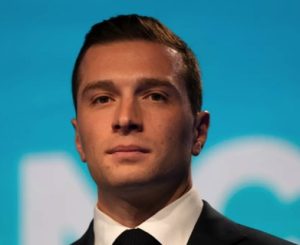
However, it came with a bit of surprise that the National Rally "only" got 31,4%, since polls credited Marine Le Pen's party list with 34-35%. Also, the presidential list was supposed to get over 15% of the votes and it arrived below this threshold.
There were many winners in these elections. Of course, the main winner is the National Rally, who improved its score by 8% to top at 31,4% far ahead of all its opponents. The Socialists more than doubled their score, from 6,2% in 2019 to 13,8% with the same number one, Raphael Glucksmann. The Rebellious also improved from 6,3% to 9,9%. And of course, Marion Maréchal's Reconquest, that did not compete 5 years ago, made it into the European Parliament with 5,5%.
On the other hand, the big losers were President Macron's proxy Valérie Hayer from Renew and the Ecologists. The list of the presidential majority lost more than 1/3 of the votes it received in 2019, going down from 22,5% to 14,6%. Renew still came second after the National Rally, but in 2019 it was only one percentage point behind the National Rally, while this time it got less than half of the National Rally's votes.
The Ecologists were also big losers of these elections, going from a record score of 13,48% in 2019 to only 5,5% in 2024.
On a lower level, the list of François-Xavier Bellamy for the Republicans lost only 1,5% compared to 2019.
When everybody thought they were heading to a quiet electoral evening, President Macron took everybody by surprise and announced the dissolution of the National Assembly and a snap parliamentary election for June 30 and July 7.
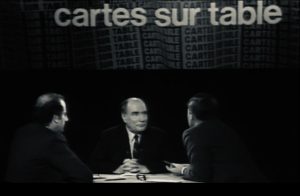
More than 40 years ago, on the 16th of March 1981, François Mitterrand was invited to a famous French political talk show called "Cartes sur table/Cards on the table", as its homonym novel signed by Agatha Christie. It was to be one of the last editions of the show hosted by Jean-Pierre Elkabbach and Alain Duhamel since 1977. The pre-electoral campaign for the French presidential elections was in full swing, with a first round scheduled on April 26, 1981.
For 64 year old Mitterrand, who previously lost two presidential elections (1965 and 1974), the upcoming election was almost certainly his last chance of becoming President. The polls were not very encouraging though: he was an underdog and acting President Giscard d'Estaing was the favourite.
The talk show went smoothly until the penultimate question, raised by Alain Duhamel: "There are currently 5 people sentenced to death and imprisoned in France. Will you pardon them (if elected)?"
This was a delicate question: it was about head of state prerogatives conflicting with the need for justice, and it was also about François Mitterrand's past, because as a young Justice Minister he did not oppose to executions of convicted criminals.
However, Mitterrand's answer was masterful: "As for the other issues, I will not hide my thoughts on this one. From the depth of my conscience, that rejoins that of the Churches - the Catholic and Reformed Churches, the Jewish religion and all the important humanitarian associations, I am against the death penalty. And I don't need to read the polls, that state the opposite: the majority of the opinions expressed is in favour of the death penalty.
Very well, I am candidate at the Presidency of the French Republic, and I request the majority of the votes of French people, but I do not request it through hiding my thoughts. I speak what I think, what I endorse, what I believe in, what my spiritual allegiances are, my belief, my caring about civilization. I am not in favour of death penalty".
François Mitterrand was often accused by the press and political competitors of being "a very secretive person". This statement made him look honest and true in front of the millions watching him. In his answer, he skilfully started by saying that "as for the other issues" he has nothing to hide on this one - a formula meant to dismiss the accusations of vagueness in many of his proposals and previous statements. He also underlined that his beliefs are those of the Catholics, Protestants and Jews of France, this way targeting a very wide basket of possible voters that traditionally were more conservative and less inclined to vote for a Socialist champion, such as Mr. Mitterrand. His powerful words were further strengthened by his look straight to the camera. François Mitterrand won his bet: French people saw that night a statesman who is ready to go against public opinion and possibly lose the presidential elections only to remain true to his beliefs.
Less than two months after this show, on May 10, 1981, Mitterrand was elected President of the French Republic. On September 18, 1981, the French National Assembly voted the draft law abolishing the death penalty, submitted by Mr. Mitterrand's government. The evening show statement became law.
Years after, Mitterrand confessed to his interviewer Alain Duhamel that his question helped him to be elected President.